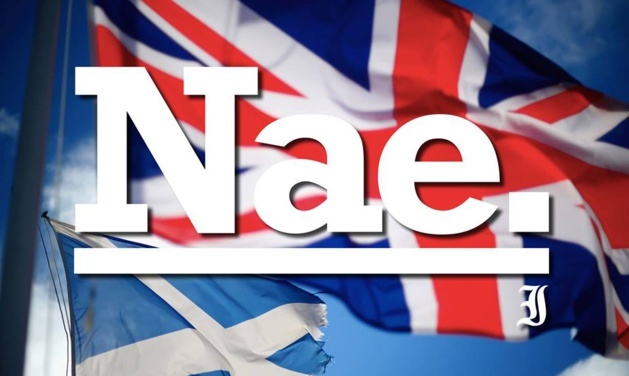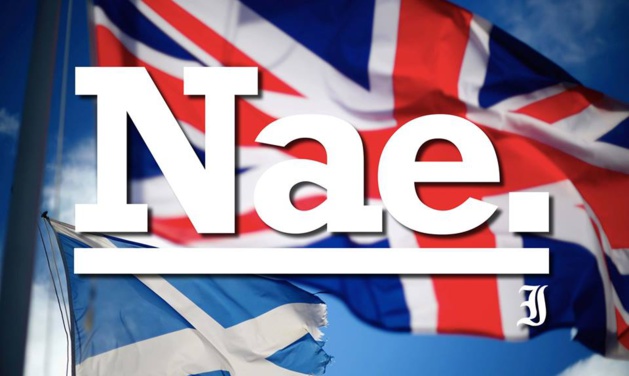
Photo credit Baptiste Gourseaud
Despite SNP’s (Scottish National Party) hopes, 55% of voters dared to contradict their own leaders and chose to follow a different path for their future. The Scottish people decided to stay in the UK three centuries after the Union Act – an averted disaster for David Cameron and his government. It seems that voters can’t see a safe and prosperous future for this nation; instead they seem to have listened to Alistair Darling, leader of the Better Together campaign and decided to stay together so they can move forward.
The value of the pound, the recognition of the European Union, all export to England, a secure future, the army, the special relationship with the US, are only a few reasons which led the ˈnoˈ campaign to gain such support from a young populace who showed more nationalism than ever in 2011. In other words, today’s results give more credibility to the current British government than the Scottish Parliament, at least for now. And while Mr Cameron is celebrating this positive feedback from Scottish people following the improvised union with the Labour party, Alex Salmond will have to decide which position to take in order to leave this fresh past behind.
Can the Torries be trusted ?
It is now hard for Scotland to keep moving forward with the feeling of being torn apart between those who voted ‘yes’ and those whose side won. Cameron, Miliband and Clegg were heading north a week ago to make sure voters would choose to stay in the Union. And even though their improvised campaign was seen as a desperate move to convince Scottish voters to stay in the UK, declarations such as Cameron’s “I care more about my country than my party” seem to have had quite an impact on voters. However, the Scottish decision does not mean that Scottish people completely changed their minds and want to be governed by the conservatives or that Ed Miliband won over the Scottish nationalists. On the contrary, voters chose today not to break the 307 year-old Union that has always put their nation’s welfare first.
If SNP was to win the next elections, Alex Salmond’s team will keep enforcing its nationalist program and will try to stand for a people mistreated over the years by Westminster and conservatives. The key point of this historical decision to avoid a “natural disaster” is that by saying “no” to independence, Scotland’s expectations for the Parliament and the representatives leading it increased tenfold. People may not have listened to their heart in this referendum but they certainly showed maturity and decided to preserve Scotland for future generations. With this vote, the Scottish nation demands “the best of both worlds”, or a wider economic, legislative, judiciary and executive autonomy, while remaining in the Union. “Devo Max” seems to be the only answer to all those demands; Cameron keeps mentioning it without saying anything concrete.
Action-Reaction : Devo Max
« Devo Max » or « Devolution Max » is a program the Prime Minister promised to introduce in Scotland after the referendum results, but despite being brought to the forefront, nobody really knows about the future legislation. It is unquestionable that this proposal reveals Westminster’s clear will to give even more power to Scotland, aiming at making it a fiscally autonomous nation. A constitutional agreement between Westminster and Holyrood would allow the Scottish Parliament to collect almost all taxes paid in Scotland so it can administrate itself, with only the ministry of Defence and of Foreign Affairs left to be managed along with the rest of the Union. The Scotland Act, drawn up by the Calman Commission in 2099 and adopted by Westminster to replace the Scotland Act of 1998, already shows the first signs of this program. Such a possibility to increase their country’s autonomy keeps the Scottish people waiting to see these promises come true. Unfortunately nobody knows what Cameron will do to more precisely define his bill proposal and avoid losing what credibility he has gained among Scottish voters.
We can therefore say that September 18th 2014 will remain a memorable day, marking the beginning of a new step for the UK and for every nation within it. Now, a sense of uncertainty runs across the country, every nation is wondering what will happen next, if nationalists will call another referendum, if David Cameron will keep his promises concerning “Devo Max”, if the UK will remain in the European Union, and above all, if the real winner isn’t Alex Salmond himself. There are many questions to be answered - in other words, the situation seems to be less clear than ever after this referendum.




























